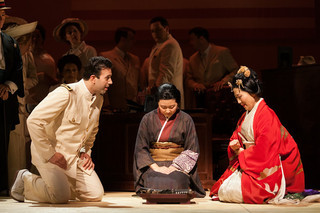|
Back
A viv, dynamic Butterfly Albany
The Alice Busch Theater
07/11/2014 - & July 13, 17, 21, 24, 26*, 29, August 3, 9, 15, 18, 23, 2014
Giacomo Puccini: Madama Butterfly
Yunah Lee (Cio-Cio-San), Dinyar Vania (Pinkerton), Kristen Choi (Suzuki), Aleksey Bogdanov (Sharpless), Ian McEuen (Goro), Chris Carr (Imperial Commissioner), Adam Cioffari (Official Registrar), Thomas Richards (The Bonze), Sean Michael Plumb (Prince Yamadori), Louis McKinny (Dolore), Erica Schoelkopf Kate Pinkerton)
The Glimmerglass Festival Chorus, David Moody (chorus master), The Glimmerglass Festival Orchestra, Joseph Colaneri (conductor)
Francesca Zambello (director), Michael Yeargen (set designer), Anita Yavich (costume designer), Robert Wierzel (lighting designer)

D. Vania, K. Choi & Y. Lee (© Karli Cadel/The Glimmerglass Festival)
Every opera director these days must display a penchant for innovation come hell or high water. For Madama Butterfly, director Francesca Zambello’s major innovation is to set the first parts of both the first and second acts in the office of the US consul, Sharpless. The year is 1906 (the year of the opera’s premiere) and among the staged details is the historically-correct 46-star American flag. Such attention to detail seems misplaced when so many details in the libretto (which sets the entire work in Butterfly and Pinkerton’s house) have to be paved over or explained away. The opera opens with the marriage broker Goro showing Pinkerton his new house; since they are in the consul’s office, Goro uses a small model of the house. Later, when Pinkerton offers Sharpless “milk punch or whiskey” he asks whether he is being offered these drinks. The office waiting room as an active place, with some of Pinkerton’s fellow officers observing (and mocking) Japanese ways as Cio-Cio-San and her party arrive. A group of American women look on with interest, and are given sheet music to join the “O kami” chorus as the wedding ceremony is carried out right there. The same ladies join in on the cries of “Cio-Cio-San!” after the Bonze invades the event and denounces her. The wedding guests’ remarks on the house simply don’t appear in the projected titles. Significantly, a number of Japanese women with babies await a meeting with the consul.
All of this is to emphasize the culture clash at the heart of the opera. But it is clearly there already - right?
The consular office works less well in Act II, for example when Suzuki serves tea (she seems to possess a handy portable tea-making kit) and when Butterfly’s toddler, Dolore, is suddenly revealed. When the scenes shift to the dwelling what we get is a large open stage with no indication of the usual cosy structure. There is no sign of the cherry blossoms until they are called for - and then they descend in bucketfulls from the flies, a wonderfully exuberant moment. And throughout, the staging benfits from Robert Wierzel's eloquent lighting.
Another staging innovation takes place during the prelude to Act III during the music known as “Butterfly’s vigil”. Here we see mimed interaction between Pinkerton and his American wife and a glimpse of their playful, flirtatious relationship.
However, I must confess that Zambello cleverly solves most of the problems arising from her concept and what emerges is an emotionally big work expressed by ample voices and direct, forceful musicianship under the festival’s music director Joseph Colaneri. Korean soprano Yunah Lee may not be the sweetest-voiced Butterfly but her voice is confident and expressive. Tenor Dinyar Vania has an attractive timbre and the power that could be used to simply bulldoze his way through the role of Pinkerton but instead shows a very nice degree of finesse and nuance. (Pinkerton must be shown to have a degree of charm - a merely boorish character is a downright bore.) Kristen Choi’s Suzuki and Aleksey Bogdanov’s Sharpless are incisively portrayed both vocally and dramatically.
The smaller roles are all ably assumed by members of the festival’s Young Artists Program (there are 39 singers among its 48 members this year). (A performance on August 3 will have YAP members also assume the four lead roles.)
Butterfly’s child is required to do more stage action in this production than I have ever seen. One example: as Pinkerton kneels over Cio-Cio-San’s lifeless body, the boy rushes in and leaps onto his father’s back, thus intensifying for us Pinkerton’s feelings of regret. Little Louis McKinny carries it all off very convincingly.
The piece seems almost too big for the intimate confines of the Alice Busch Theater - this is a compliment, not a complaint. It certainly helps bolster the festival’s policy of revisiting a staple of the repertory each season.
Michael Johnson
|